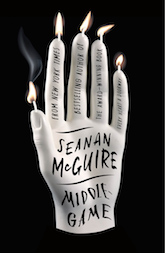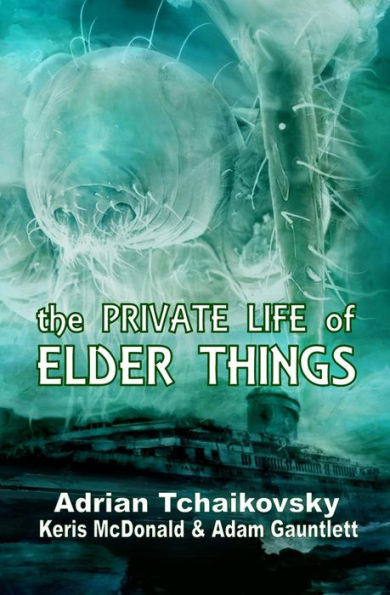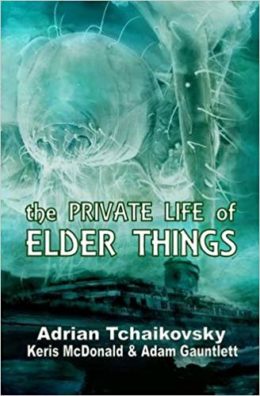Welcome back to the Lovecraft reread, in which two modern Mythos writers get girl cooties all over old Howard’s sandbox, from those who inspired him to those who were inspired in turn.
This week, we’re reading Adrian Tchaikovsky’s “Donald,” first published in The Private Life of Elder Things in 2011. Spoilers ahead.
“I remember thinking when I first saw him—well, there’s a man who’s not going to win hearts and minds just by smiling at them.”
Summary
Unnamed narrator, a professor of ichthyological taxonomy, sits in a study walled with glass cases of finny specimens. An agent for one of “certain little branches of the intelligence agencies” is interviewing him about Donald Toomey. Strange, narrator muses, that he and Donald should have become such good friends, and he’s not just talking about Donald’s off-putting appearance, his stooped posture and bad skin and wall-eyes. When they first met at a conference, narrator had no interest in sustainable fishing and marine conservation, topics about which Donald was a passionate, radical advocate, but Donald was so energetic and intelligent he won narrator over—and plenty of others.
Because of Donald’s activism, though, he had trouble getting a research post. Narrator hired him as an assistant to get him started. Soon Donald moved on to the position at Hull he’d coveted, but he didn’t forget narrator; every four or five months, he’d send narrator a letter in his “unruly” handwriting, along with a specimen for his collection. And what specimens! Though his agent interviewer is no ichthyologist, surely he’ll be impressed by this juvenile Xiphactinus. No? Just an ugly fish? Ah well.
Over the years Donald’s handwriting deteriorated, but never his incisive mind. Finding himself in Hull one day, narrator looked his friend up. Much to his shock, he learned that Donald had disappeared from his research institute three years before. By that time, he’d become erratic, painfully conscious of his appearance. For all any colleague knew, he might have walked into his beloved sea. Narrator knows better, for he’s had five letters from Donald during those three years. To be sure, Donald’s return address was a post-office box, but that had always been the case.
Narrator wrote at once to Donald, asking what was up. Around the same time, he had the first visit from the Mysterious Agency. He suspects the agency began to tamper with his correspondence. That was why narrator switched from writing to hanging about dingy seaside resorts and port towns, from whose shadier maritime folk he could receive word from his friend.
Yes, narrator lied to agents about his contact with Donald. He’d become aware there was a clandestine war between those certain little branches of intelligence and “the Donalds of this world.” Something to do with cults, apocalyptic prophecies, occult whatnot and other nonsense. Oh, and charges may be brought against narrator? Perhaps agent’s masters should take care, given what happened in Portsmouth.
Buy the Book


Middlegame
And now down to narrator’s reason for the present interview. He has a list of demands from Donald. The agent will see it needs to go straight to the top, prior to the upcoming environmental summit. “Our” representative there will propose a broad range of reforms, from “a new ethical directive on overfishing” to cleaning up the oceans, saving the planet. The green lobby will love it, and if fishermen and industrialists complain, too bad. Is anything more important than the future of the world?
But if saving the world doesn’t motivate small-minded thugs like the agent, let them consider that “curiously specific” tidal wave that swamped Portsmouth yesterday. Forty thousand drowned or crushed—or taken. Donald and his friends were more interested in the people than the property destruction. They have many uses for people.
It’s interesting to think about how much of human civilization is coastal, isn’t it? Sure, the Donalds have a different view of the world. Sure they have their crazy religions, as humanity does. But as Donald said from the start: “We have to look after the planet, because we’re sharing it with such a wealth of life.”
Narrator concludes: If we don’t take care, some of that life may decide they don’t want to share the planet with us.
What’s Cyclopean: Narrator’s high-level vocabulary is mostly biology jargon. Surely this Xiphactinus specimen must excite you? No?
The Degenerate Dutch: The only distinction the Donalds of the world make among land-bound humans is whether or not they live in coastal communities.
Mythos Making: Down in the depths of Y’ha-nthlei, the Deep Ones are less than thrilled about ocean acidification.
Libronomicon: When you have friends in deep places, some of your findings get too weird for even the most esoteric ichthyology journals.
Madness Takes Its Toll: No madness this week. At worst, what we have is a peeved scientist and some extremely frustrated Men in Black.
Anne’s Commentary
Imagine we’re out in a smallish and unsettlingly tippy boat with extreme angler Jeremy Wade, famous for his River Monsters TV series. We float near the mouth of a stream emptying from the heart of a tropical islet into the vast South Pacific. The water here is murky from inland silt, so that the fish that pass beneath our (tippy) hull are vague shadows. One shadow is big. Very big. As it rises to the surface and resolves from shadow into reality, all twenty feet of its fang-toothed predatory splendor, we and Jeremy decide neither to fish nor cut bait. Time to fire up the outboard motor and hope it doesn’t stall. Yes, yes, our ichthyologist friend would love to add a mature Xiphactinus to his collection, but he’ll have to wait until Donald sends him one.
I love how Tchaikovsky’s narrator teases his interrogator with the juvenile Xiphactinus. Teases and tests him, because as narrator knows full well, this “ugly fish” reigned during the Late Cretaceous. It’s been extinct for a long time, or so conventional ichthyological wisdom supposes; however, narrator’s good friend Donald has access to strange waters. Abysmally deep waters, where many lost species swarm around weedy odd-angled ruins.
Tchaikovsky never mentions R’lyeh, though, or Cthulhu, or Father Dagon and Mother Hydra. He and his narrator drop not a single Mythos name, a narrative strategy that allows the initiated to construe such clues as Donald’s “deteriorating” appearance into “Ah hah! We’re talking Deep Ones here. Donald must hail from England’s Innsmouth, as described by Neil Gaiman. Lovely little town, that, for all its pesky habit of disappearing on the morning after one’s sampled the Shoggoth’s Old Peculiar.” The uninitiated may be able to enjoy the story without any acquaintance with Lovecraft; or they may sense that they’re missing something here, they’re underinformed, left out of the in-joke. This is a risk the narrative strategy takes. Then again, dropping Mythosiana on the uninitiated is also a risk. The uninitiated don’t know how to dodge the tentacled and spikey bits.
I geeked out on the Xiphactinus reference and the thought of touring narrator’s collection (with plenty of handkerchiefs to contain the slavering). I looked forward to narrator pressing a particular glass jar to spring open a hidden alcove, in which we’d find a perfectly preserved Deep One—alas, Donald himself, slaughtered by the authorities, his body delivered to narrator because Donald knew narrator would treasure it as the ultimate specimen. Muhahaha, you prying intelligence agent! You wanted to know where Donald Toomey went? Now you know, and now you’ll join him! (Gunshot or, more appropriately, slash of a dissecting knife.)
But Tchaikovsky takes his story in a more interesting direction. From the cozy study-side opening, we gradually slide into a moral—and existential—quandary. Ichthyologist narrator sympathizes with Donald, a brilliant fellow socially spurned for his unfortunate personal appearance and academically rejected for his radical views on marine conservation. The reader therefore sympathizes both with Donald and his champion. Whereas the interrogator’s obviously an incurious oaf—look at how he fails to appreciate the juvenile Xiphactinus! After Donald disappears from his research post at Hull, his colleagues seem little concerned. “Cagey” as they are, narrator senses they think Donald might have drowned himself, and oh well, he was getting uglier and more erratic, no big loss. Narrator on the other hand wonders if poor Donald might have suffered a traumatic relationship, more rejection. That a shadowy government agency is after him spurs narrator’s sympathy still higher, and reader’s.
Then narrator starts communicating with Donald through (as he himself implies) dicey channels. He speaks to people who’ve witnessed things that would pop an intelligence agent’s eyes, things the ignorant would associate with cults, prophecies, mysticism. He admits he’s been lying to the authorities, and so what? Just sticking up for a misunderstood friend. Just siding with him against the forces arrayed against all the Donalds of the world.
Yes, there are more of them, and like his fellows, Donald no longer confines his activism to “chaining himself to this and sabotaging that.” He’s become a full-fledged (-scaled?) warrior in the clandestine war between humanity and his kind. Can you blame him? He’s always been so angry about pollution and overfishing and all man’s other depredations upon the natural world!
Hmm. Narrator’s getting a little confrontational, we might say? Even a little threatening? The authorities want to charge him with something? Well, they better stop and consider what happened to Portsmouth yesterday!
What happened in Portsmouth was a “curiously specific” tidal wave that crushed buildings like eggshells and killed forty thousand people and carried off others for the unmentioned (no doubt unmentionable) uses of the Donalds, but hey, every group has its crazy religions, right? Let’s have none of this sword calling the trident black, shall we?
I figure that about now in the conversation, the intelligence agent is pushing his call-for-backup button. At the same time, the reader is likely backing up from his initial sympathy for narrator and Donald. It’s not that most readers wouldn’t agree with Donald’s sentiment (as stated by narrator as Donald’s supreme defense) that humanity has to look after the planet, because it shares it with such a wealth of life.
Absolutely. Let’s do it! But if some humans screw up, must all humanity perish? Can we human readers continue to sympathize with narrator (and the Donalds) when they go there? Which narrator does in the last line of the story. If humans don’t shape up, “some [other life forms] may decide they don’t want to share [the world] with us.”
Some other life forms being the Donalds. I read the Deep Ones, whom I love just to death. Only I’d prefer it not be my death. So, Donalds, can we try diplomacy first? We promise to consider your list of demands with open minds, however inconvenient your truths may be.
I mean, now that you’ve put your webbed feet down so dramatically.
Ruthanna’s Commentary
Anthologies have a bit of a reputation. Sure, every once in a while you get something like Dreams From the Witch House, where almost every story hits it out of the park, or the unfortunate reverse case where an editor seems to have tastes precisely inverted from one’s own. But most often any given anthology will have a couple of fabulous pieces, a couple that happen to suit one’s personal tastes, and a couple that are the bane of people who can’t bear to skip a word of a book. Most people will pick up an anthology if they really trust the editor, or if they love the author list, or if the concept is so amazing that they just have to support the Kickstarter, table of contents unseen.
All of which is to say that it’s unusual for a subgenre to be quite so dependent on the vagaries of the anthology market as modern Lovecraftiana. And yet, while there are a couple of dedicated magazines to provide a regular influx, and while most horror and fantasy venues will publish the occasional tentacular extravaganza, the vast majority of the modern Mythos shows up in anthology format. The recommendation algorithm for my e-reader informs me that I own, at best, a minuscule fraction of the available bounty. Along with the general Mythosian anthologies by frequent-flyer editors, there are anthologies of science fictional Cthulhu stories and historical Cthulhu stories. Noir detective, corporate, and Halloween-flavored Mythos tales. Anthologies of stories entirely by women (marketed as such) and anthologies of stories entirely by men (not marketed as such). Anthologies of stories that are just about Deep Ones, or the world after the rise of the elder gods, or Lovecraft/Holmes slash. One can be an extremely hard sell and still have a shelf full of favorites.
Buy the Book


The Private Life of Elder Things
And yet, spurred by a comment from Anne, I’ve just been on a small spending spree. Anne wondered if we might find more sources for stories in translation; while searching for those, I also picked up a couple of compilations where I couldn’t resist the concept or the author list. “Donald” comes from the three-authored The Private Life of Elder Things collection—in this case, it was the title that drew me in—and makes for a promising first selection. Deep One stories are a dime a dozen, but my favorites walk a fine line between sympathetic deconstruction and eldritch intrigue.
“Donald” posits powerful Deep Ones, genuinely capable of threatening humanity—and puts them counter to a powerful humanity who are genuinely (and actively) capable of threatening the oceans they call home. I’m not a big fan of tidal waves as a negotiating tactic, but as a way of getting the nations of the world to just stop messing around and do something about climate change what the hell is wrong with you, it has a certain attention-grabbing pointedness that I can appreciate. And so, probably, can many coastal communities dealing with the slower-motion disaster, just so long as nobody actually makes the point in their direction.
What really makes this story, though, is the narrator. Of course the ichthyology geek is friends with the Deep One, and has stayed friends with him through his metamorphosis. And of course the ecoterrorist Deep One hasn’t been able to resist sharing a few deep-sea samples with his nerdy friend. I imagine this poor team of Men in Black, trying to follow up on the Portsmouth disaster, stuck listening to Narrator go on about his collection of “ugly fish” while they wait for him to get around to the interspecies negotiation.
And, also of course, the guy who can appreciate the scholarly import of those “ugly fish” can also get past a fellow scholar’s Innsmouth look to the important ideas beneath. If we can manage to stop threatening each other with ecological disasters, Tchaikovsky’s humans and Deep Ones might have a lot to talk about.
While we’re still waiting for those translation anthologies to arrive, we look a little further ahead in the current collection to Keris McDonald’s “Special Needs Child.” The private life of… ghouls? Ew. Reader beware.
Ruthanna Emrys is the author of the Innsmouth Legacy series, including Winter Tide and Deep Roots. She has several stories, neo-Lovecraftian and otherwise, available on Tor.com, most recently “The Word of Flesh and Soul.” Ruthanna can frequently be found online on Twitter and Patreon, and offline in a mysterious manor house with her large, chaotic household—mostly mammalian—outside Washington DC.
Anne M. Pillsworth’s short story “The Madonna of the Abattoir” appears on Tor.com. Her young adult Mythos novel, Summoned, is available from Tor Teen along with sequel Fathomless. She lives in Edgewood, a Victorian trolley car suburb of Providence, Rhode Island, uncomfortably near Joseph Curwen’s underground laboratory.










